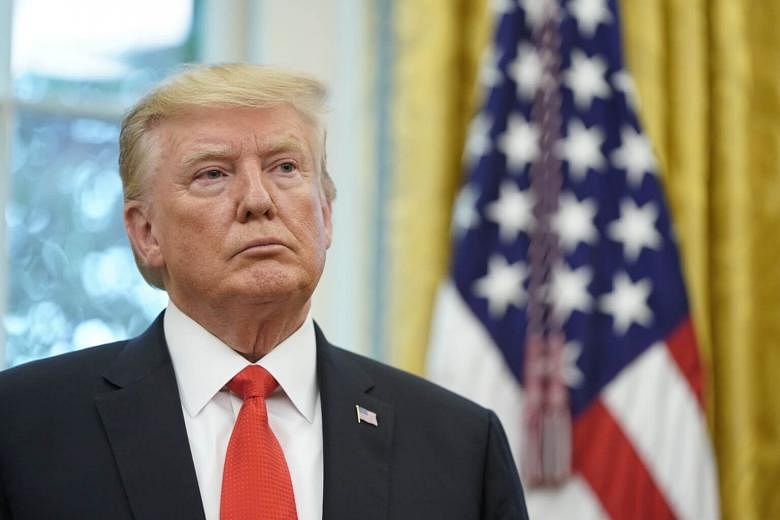KABUL (REUTERS, AFP) - President Ashraf Ghani's office on Sunday (Sept 8) said real peace in Afghanistan was only possible when the Taleban stopped their violence and held direct talks with the government.
US President Donald Trump on Saturday cancelled peace talks with the Taleban's "major leaders" at a presidential compound in Camp David, Maryland after the insurgent group claimed responsibility for an attack in Kabul last week that killed an American soldier and 11 other people.
Taleban fighters, who now control more territory than at any time since the war started in 2001, launched assaults on the northern cities of Kunduz and Pul-e Khumri over the past week and carried out two major suicide bombings in the capital Kabul.
"Real peace will come when Taleban agree to a ceasefire," Ghani's officials said in statement in response to Trump's cancellation of secret peace talks.
In a weekend bombshell, Trump said that he had planned previously unknown talks with the two sides on Sunday in Camp David, the presidential retreat in Maryland, but that the Taleban's persistent, grisly campaign of violence made them untrustworthy partners.
"Unbeknownst to almost everyone, the major Taleban leaders and, separately, the President of Afghanistan, were going to secretly meet with me at Camp David on Sunday," Mr Trump said in a tweet.
"Unfortunately, in order to build false leverage, they admitted to an attack in Kabul that killed one of our great great soldiers, and 11 other people. I immediately cancelled the meeting and called off peace negotiations." "What kind of people would kill so many in order to seemingly strengthen their bargaining position? They didn't, they only made it worse!" Mr Trump said.
Trump's surprise announcement left in doubt the future of a draft peace accord worked out last week by Zalmay Khalilzad, the special US envoy for peace in Afghanistan. If realised, the summit would have been the latest high-profile, high-stakes diplomacy by the mogul-turned-president, who is fond of dramatic gestures.
Under the draft accord some 5,000 US troops would be withdrawn over the coming months in exchange for guarantees Afghanistan would not be used as a base for militant attacks on the United States and its allies.
A full peace agreement to end more than 18 years of war would depend on "intra-Afghan" talks involving officials and civil society leaders as well as further agreement on issues including the remainder of the roughly 14,000-strong US forces as well as thousands of other Nato troops.
Ghani, Afghanistan's internationally recognised president, had been outspoken in his criticism of the shape of the withdrawal agreement with the Taleban, who have refused to negotiate with his government.
Ghani's office said it was committed to working together with the United States and allies for a "dignified and long-lasting peace", and emphasised the holding of the presidential election this month.
Ghani is seeking a second tenure in elections scheduled for Sept 28, but the Taleban want the elections to be cancelled as a precondition to signing a peace accord with the Americans.
"A strong, legitimate and a legal government through the upcoming elections to take the ongoing peace process forward with complete accuracy and prudence," said the Ghani statement.
The Taleban spokesmen were not available for a comment.
The Taleban's strategy of fresh assaults appears to be based on the assumption that battlefield success would strengthen their hand in future negotiations with US and Afghan officials.
Some of their field commanders have also said they are determined not to surrender gains when they are close to victory, suggesting the leadership is under internal pressure not to concede a ceasefire.
The fight against Al-Qaeda was the initial reason for the US-led war that overthrew the Taleban following the Sept 11, 2001, attacks on the United States.
But US public opinion has soured on nearly two decades of war and Mr Trump, after initially being persuaded to reinforce US troops, has said that the United States should not be involved in "endless" war.
Mr Trump had been uncharacteristically reticent about Afghanistan in recent weeks, with all eyes on whether he would approve a final deal.
Washington had hoped that a withdrawal of US troops would lead to negotiations between the Taleban and Kabul on a more permanent peace.
Speaking earlier Saturday in Paris, Defense Secretary Mark Esper said that the United States would only accept a "good deal" with the Taleban - words welcomed by the government in Kabul.
But Trump's abrupt announcement draws a new question mark on whether the United States will leave Afghanistan anytime soon.
The decision comes weeks before Afghanistan is set to hold elections, an unwieldy exercise even in more stable times.

